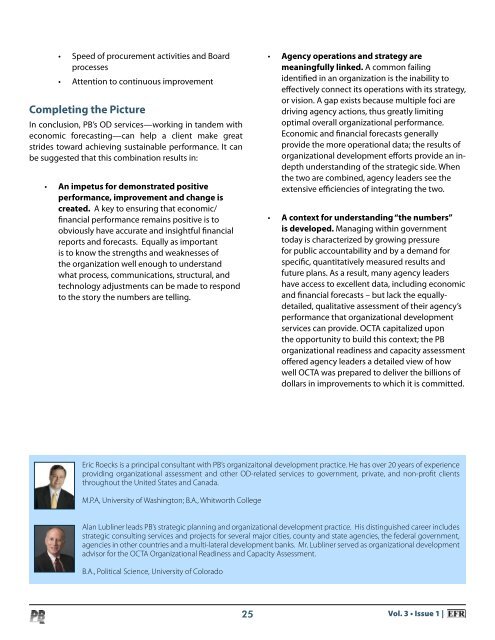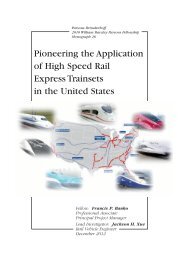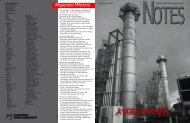Volume 3 Issue 1.indd - Parsons Brinckerhoff
Volume 3 Issue 1.indd - Parsons Brinckerhoff
Volume 3 Issue 1.indd - Parsons Brinckerhoff
You also want an ePaper? Increase the reach of your titles
YUMPU automatically turns print PDFs into web optimized ePapers that Google loves.
• Speed of procurement activities and Board<br />
processes<br />
• Attention to continuous improvement<br />
Completing the Picture<br />
In conclusion, PB’s OD services—working in tandem with<br />
economic forecasting—can help a client make great<br />
strides toward achieving sustainable performance. It can<br />
be suggested that this combination results in:<br />
• An impetus for demonstrated positive<br />
performance, improvement and change is<br />
created. A key to ensuring that economic/<br />
financial performance remains positive is to<br />
obviously have accurate and insightful financial<br />
reports and forecasts. Equally as important<br />
is to know the strengths and weaknesses of<br />
the organization well enough to understand<br />
what process, communications, structural, and<br />
technology adjustments can be made to respond<br />
to the story the numbers are telling.<br />
• Agency operations and strategy are<br />
meaningfully linked. A common failing<br />
identified in an organization is the inability to<br />
effectively connect its operations with its strategy,<br />
or vision. A gap exists because multiple foci are<br />
driving agency actions, thus greatly limiting<br />
optimal overall organizational performance.<br />
Economic and financial forecasts generally<br />
provide the more operational data; the results of<br />
organizational development efforts provide an indepth<br />
understanding of the strategic side. When<br />
the two are combined, agency leaders see the<br />
extensive efficiencies of integrating the two.<br />
• A context for understanding “the numbers”<br />
is developed. Managing within government<br />
today is characterized by growing pressure<br />
for public accountability and by a demand for<br />
specific, quantitatively measured results and<br />
future plans. As a result, many agency leaders<br />
have access to excellent data, including economic<br />
and financial forecasts – but lack the equallydetailed,<br />
qualitative assessment of their agency’s<br />
performance that organizational development<br />
services can provide. OCTA capitalized upon<br />
the opportunity to build this context; the PB<br />
organizational readiness and capacity assessment<br />
offered agency leaders a detailed view of how<br />
well OCTA was prepared to deliver the billions of<br />
dollars in improvements to which it is committed.<br />
Eric Roecks is a principal consultant with PB’s organizaitonal development practice. He has over 20 years of experience<br />
providing organizational assessment and other OD-related services to government, private, and non-profit clients<br />
throughout the United States and Canada.<br />
M.P.A, University of Washington; B.A., Whitworth College<br />
Alan Lubliner leads PB’s strategic planning and organizational development practice. His distinguished career includes<br />
strategic consulting services and projects for several major cities, county and state agencies, the federal government,<br />
agencies in other countries and a multi-lateral development banks. Mr. Lubliner served as organizational development<br />
advisor for the OCTA Organizational Readiness and Capacity Assessment.<br />
B.A., Political Science, University of Colorado<br />
25 Vol. 3 • <strong>Issue</strong> 1 |

















